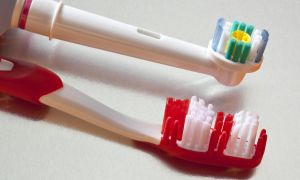Advertisement
Leukoplakia, a condition in which thick white lesions develop inside the mouth, isn't contagious. However, one form of the condition, called hairy leukoplakia, is caused by the Epstein-Barr virus, which is contagious. As for regular leukoplakia, the biggest culprit seems to be smoking and chewing tobacco. So if you want to avoid getting white, fuzzy patches of leukoplakia on your tongue, avoid tobacco -- not other people.
Thick, whitish-color patches that form on the inside of the cheeks, gums or tongue is known as leukoplakia. These patches are not contagious and can be caused by excess cell growth and are common among tobacco users. They can result from irritations such as an ill-fitting denture or the habit of chewing on the inside of the cheek. Sometimes leukoplakia is associated with oral cancer. Your dentist may recommend a biopsy if the patch appears threatening.
Continue Learning about Oral Health
Important: This content reflects information from various individuals and organizations and may offer alternative or opposing points of view. It should not be used for medical advice, diagnosis or treatment. As always, you should consult with your healthcare provider about your specific health needs.




